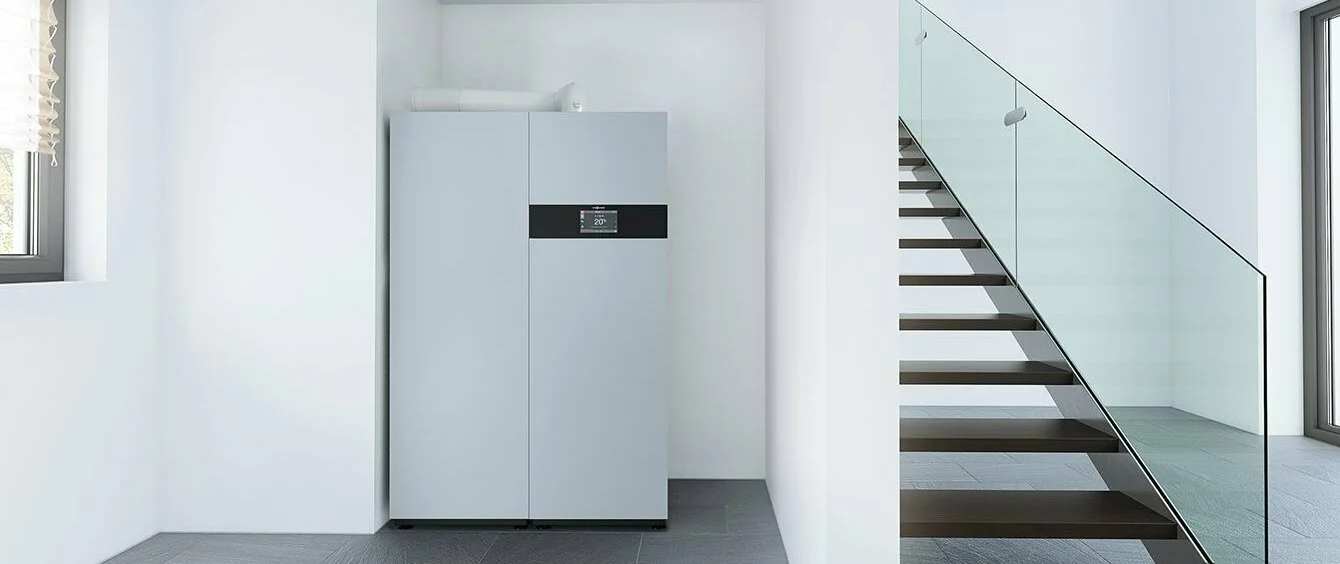Fuel cells function as electricity-generating heating systems, delivering both thermal and electric energy. In the North Rhine-Westphalian town of Bedburg, a new neighbourhood has been developed, in which this innovative technology is the only kind of heating system allowed.
The road in the new housing development is called “Am End” [German slang for “at the end”]. But the homemakers in Königshoven are actually at the cutting edge of innovation, as a residential area running on fuel cells is currently being constructed there. Königshoven is a part of Bedburg, a town 40 kilometres north-west of Cologne. It is one of the first of its kind in Germany. Eight families in this neighbourhood will be generating their own heat and electricity in the future. The very location itself is symbolic of the energy transition: the new neighbourhood has a view of large lignite-fired power plants and is only separated from the Garzweiler opencast mine by a vast expanse of recultivated land.
Making a small contribution to the big picture
As Michael Schiffer, one of the new homeowners, explained, “We like the idea of being able to heat our homes very efficiently and, at the same time, generate electricity.” The 32-year old salesman has been living in his new house with his wife Kathrin and two children since November 2017. The base fuel for this innovative form of autonomous energy supply comes from the gas mains. But the fuel cell doesn’t burn the gas. Using oxidation with the ambient air, it splits the methane much more efficiently into oxygen and water. This ‘cold combustion’ produces electricity and heat. The unit generates one kilowatt of thermal energy and an electric output of 750 watts. Hardly bigger than a refrigerator, it only takes up 0.65 square metres and operates quietly. Furthermore, it is easy to manage using a smartphone or tablet computer. The system is connected to the power grid, so that the operator can feed in surplus electricity and compensate for any additional power needs.
With their new home, the Schiffers are making their own private energy transition a reality. Thanks to the system’s high overall efficiency, the family saves money compared to the costs of conventional heating and electricity systems. And the specific CO2 emissions are also lower, by at least five tonnes per year. If a battery is additionally installed, it is possible to reduce the CO2 emissions produced by the residential heating and power supply system by up to 50 per cent, according to the manufacturer Viessmann. As Michael Schiffer said, “That’s only a small contribution. But for climate protection, it will make a difference if this innovative technology spreads.”
Startup assistance in the form of consulting and funding
The startup conditions for the eight new homeowners were attractive: the Federal Ministry for Economic Affairs and Energy provided subsidies of almost 10,000 euros for installation of the fuel cells in the houses though the KfW Energy Efficiency Incentive Programme (APEE). The landowner RWE Power financed the necessary consulting on energy and subsidy-related issues. “We also awarded a property development grant. All in all, we provided around three-and-a-half thousand euros,” said RWE specialist Britta Strommenger. The renowned equipment manufacturer Viessmann, a pioneer in climate-friendly fuel cell technology for residential applications, provided roughly another 1,500 euros. A total of 14,250 euros in funding was provided.
“Considering that around 70 per cent of all heating boilers in Germany are obsolete and need to be replaced, this project represents an important contribution to a sustainable, clean and available technology with great potential for climate protection,” wrote KlimaExpo.NRW to the City of Bedburg at the end of 2016. KlimaExpo.NRW is an initiative of the government of the State of North Rhine-Westphalia, which focuses on climate protection as a driving force for progress. The goal is to showcase forward-looking projects in the region for the broader public, helping to promote active involvement and awareness of climate protection.
Praise for an innovative pilot projectt
The Town of Bedburg took the initiative in developing the fuel cell neighbourhood with RWE Power and established the necessary conditions through its zoning regulations: home builders are only allowed to install fuel cell-based heating systems; traditional oil or gas-fired boilers are not allowed, and heat pumps have also been ruled out.
KlimaExpo.NRW has included the fuel cell neighbourhood in its list of reference projects for developing neighbourhoods, recognising the significance of this project. In selecting qualified projects, KlimaExpo.NRW places great emphasis on solutions which are particularly innovative and transferable. According to Sascha Solbach, Mayor of Bedburg, “This project demonstrates that the Rhenish coal-mining region has developed into a centre for innovative and alternative forms of energy.”
This is also reflected by the decision by Innovation Region Rhenish Mining Area (IRR) to highlight the new neighbourhood as a pilot project for structural transition in this region of opencast mining and power plants. As Erik Schöddert, Head of Land Management at RWE Power, noted, “The fuel cell neighbourhood shows once again how flexibly and successfully we are continuing to develop this region with our municipal partners. The mining region itself actually deserves this praise, because it clearly confirms that the Erft-Ruhr region is a strong factor behind innovation in the State of North Rhine-Westphalia.”
